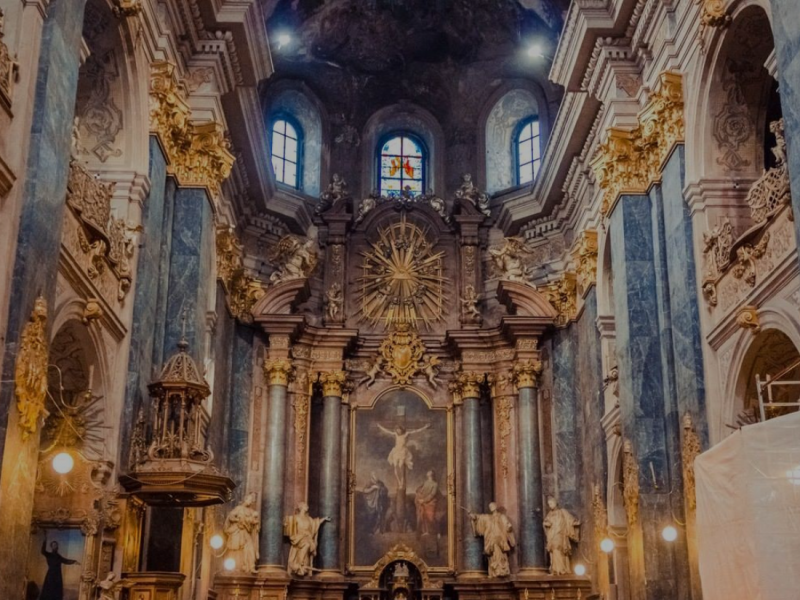
CAPTION: Built by Jesuit missionaries in the 17th century, the Saints Peter and Paul Garrison Church in Lviv was damaged during World War II and used to store more than 2 million books during the Soviet Era. The United Nation’s cultural agency, UNESCO, has reported that 29 religious sites, 16 historic buildings, four museums and four monuments are confirmed to have been damaged in Ukraine – despite the best efforts of its citizens. Outdoor monuments and statues across the country and the interior of historic churches have been braced with sandbags. Museum staff have stored works of art underground or moved them for safekeeping. Sadly, the Museum of Local History in Ivankiv, a town northwest of Kyiv, burned down in a Russian attack. The items lost included 25 painting from celebrated artist Maria Prymachenko.
During National Poetry Month, while war continues to rage in Ukraine, it seems appropriate to share the work of Ukrainian poet Taras Shevchenko. Born into a family of serfs on an estate in what is now central Ukraine during Russian occupation, Shevchenko penned “Calamity Again” in 1859.
He could have been writing about today.
“Dear God, calamity again! It was so peaceful, so serene; We had just begun to break the chains That bind our folk in slavery When halt! Once again the people’s blood Is streaming …”
And then there is 57-year-old writer Borys Humenyuk, who lives in western Ukraine. His poem, “When You Clean Your Weapon,” expounds on an overlooked victim of warfare: one’s humanity.
“When you clean your weapon / When time and again, you clean your weapon / When you rub strong-smelling oils into your weapon / And shield it from the rain with your own body / When you swaddle it like a baby / Even though you’ve never swaddled a baby before – / You’re only nineteen, no baby, no wife – / The weapon becomes your only kin / You and the weapon are one. … / Your hands, face, hair, clothing, shoes – / No matter how much you wash them – smell of gunpowder / They smell of war / You smell of war / You and war are one.”
I developed a fondness for writing and reading poetry during high school and into college. Unlike anything else, it distills emotion. The best examples lean on understatement to encapsulate what everyone is feels. It connects on an almost primal level.
“I write because … / Ukrainians deserve the world’s collective compassion and support as they fight to save their country, their livelihoods. / butchers, bakers and candlestick makers are facing off against tanks, bombs and the threat of nuclear warfare. / no monument is tall enough nor wall long enough to fully capture the depth of their sacrifice in the name of freedom. / we should honor their heroism and their remarkable demonstration of solidarity in the face of overwhelming odds. / far from foolhardy, these ordinary people are extraordinarily brave. / our collective conscience compels us do something to help. / offering these heartfelt words of encouragement is one thing I can do.”
More than 5 million people have fled Ukraine since the invasion, with many of them going to Poland, Romania and Hungary. And untold numbers of their fellow Ukrainians have been driven from their homes or killed in their beds.
I have joined a growing number of Americans who have opted to fly in the Ukrainian flag as a sign of solidarity. Brewer Banner Designs in New Bedford, Massachusetts, is donating half of the proceeds from each Ukrainian flag it makes and sells to Doctors Without Borders. For information, go to www.brewerbanner.com.
The Milwaukee-based National Bobblehead Hall of Fame has unveiled a bobblehead of Ukraine President Volodymyr Zelenskyy. From every $30 Zelenskyy bobblehead that’s sold, $5 will be donated to GlobalGiving’s Ukraine Crisis Relief Fund. For information on these bobbleheads, expected to ship in July, go to bit.ly/ukrainebobble.
Charitynavigator.org, the Better Business Bureau (give.org) and charitywatch.org are among the watchdog organizations vetting the myriad of charities responding to war in Ukraine.
•••
The final program in the 36th annual Sampler Lecture Series will occur at 3 p.m. Monday.
“Vibrant, Resilient, Still Here: Contemporary Native Americans in Illinois” will be presented by Pamala Silas, a member of Menominee Tribe of Wisconsin and a descendant of the Oneida Tribe, works for Northwestern University as the associate director for the Center for Native American and Indigenous Research.
Silas will touch on history of Native Americans in northern Illinois, as well as their role today. Explore how the public learns about and views Native Americans, as well as discuss demographic data, topical community issues and values, and engage through recommended readings and resources.
This program is made possible by a grant from Illinois Humanities.
• Kurt Begalka, former administrator of the McHenry County Historical Society & Museum in Union.